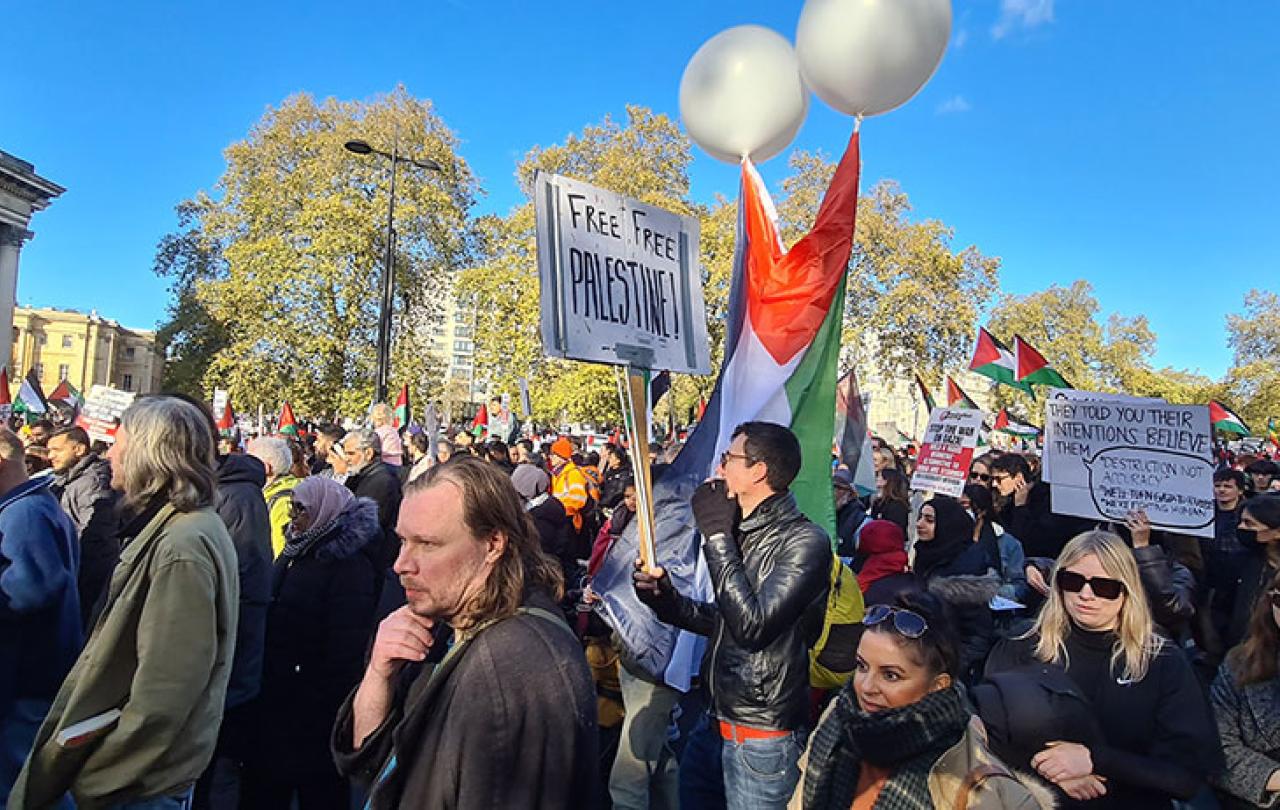
The Home Front of the Gaza war opened up in Britain last weekend. There had been pro-Palestinian marches since the conflict began on 7th October, but for many here it remained the equivalent of a “phoney war”, waged thousands of miles away.
What brought it home were the threats to civil order presented to us over the Remembrance weekend. We now know that the end was drawing nigh for home secretary Suella Braverman when she wrote in The Times last week that the police response to self-styled peace marchers was inadequate.
Whether or not her words inflamed far-right yobs to attack police at the Cenotaph is a matter of conjecture, but that and the massive pro-Palestine protest last Saturday leave no doubt that Israel’s military response to the Hamas atrocities on its people is now a very live issue on British soil.
Many of us have consequently spent this week wondering about the right and proper way to respond to these events. We are, in a way, spoilt for commentary. Paul Goodman wrote presciently in The Times at the start of the week that there had always been a policy fault line between prime minister Rishi Sunak and his home secretary, just ahead of their political tectonic plates shifting, precipitating Braverman’s condemnatory earthquake of her former boss’s alleged betrayal and weakness.
No one can be left in any doubt that there is now support for Hamas terrorism and racist intimidation of Jews on British streets. As a people, we can’t sit idly by and witness this development. The big question is what we do to protect the peace and who does it. Goodman concluded his piece by writing this:
"We are waiting for someone, somehow, to help bring people of all kinds, ordinary Muslims not least, into a great political alliance of moderation, decency, sense and, yes, Britishness. Who is this saviour? Your guess is as good as mine."
In an otherwise excellent piece, I’m tempted to respond to this pay-off thus: Well, duh! It’s almost like someone saying wistfully, in response to the challenges of illegal immigration which the UK faces, that if only there was some kind of pan-European federation of which we could be a member in order to sort the problem out collectively. The answer to that is staring us in the face, as is the answer to the question Goodman raises.
I’d hope I don’t have to spell it out. It is the duty, even the obligation, of a state that has the Christian Church established in law as its moral arbiter to deploy those who witness to its faith as peacemakers between the potentially warring factions in our midst. If that means getting between Hamas sympathisers, racist yobs and frightened Jews who may or may not be Zionists, then so be it.
We should confront in peace, though firmly, those who chant racist and hateful slogans. We should be visible in our demand for peace; that demand made to our polity, to our people and the United Nations.
Though we should not rejoice in it, this is our moment. So is this nation visible in its Christian witness to peace and reconciliation, to the defence of the helpless and innocent at the hands of those who would do them harm and would kill them? I’m afraid not.
True, the House of Bishops of the Church of England has issued an unequivocal statement on the last day of October, calling for a kind of peace. It calls for the release of Israeli prisoners held by Hamas; for “humanitarian pauses” in the conflict to allow for the evacuation of suffering civilians; for safe areas for them and for the observance of “international humanitarian law”.
But it stops short of calling for ceasefire. Why? Is there not a gospel imperative that the killing has to stop? But, anyway, the truth is that these are just words. We are called to action too.
The organisers of the pro-Palestinian protests in the UK to date have called them peace marches. From what I’ve witnessed so far, I’ve no doubt that the vast majority of participants are doing just that – marching for peace.
The Church should either join them, or organise its own peace marches, led by the cross, alongside people of all faiths and none. We should confront in peace, though firmly, those who chant racist and hateful slogans. We should be visible in our demand for peace; that demand made to our polity, to our people and the United Nations.
Perhaps it is too much to hope that this leadership comes from our bishops. It may need to be a movement from the base up, the way Christian witness has been most effective throughout its history. Last weekend, a friend of mine visited a town-wide church celebration, “flags of all nations on the walls, 500 folk… a mix of elderly 1980s Charismatics, trendy Anglicans, plain Baptists and independents, African diaspora Pentecostals, young hipsters of all ethnicities”.
This is where the hope will come from, (in every sense) the peaceful mass. So, when the estimable Mr Goodman asks rhetorically “who is this saviour?”, our answer should be clear: It’s ours.





